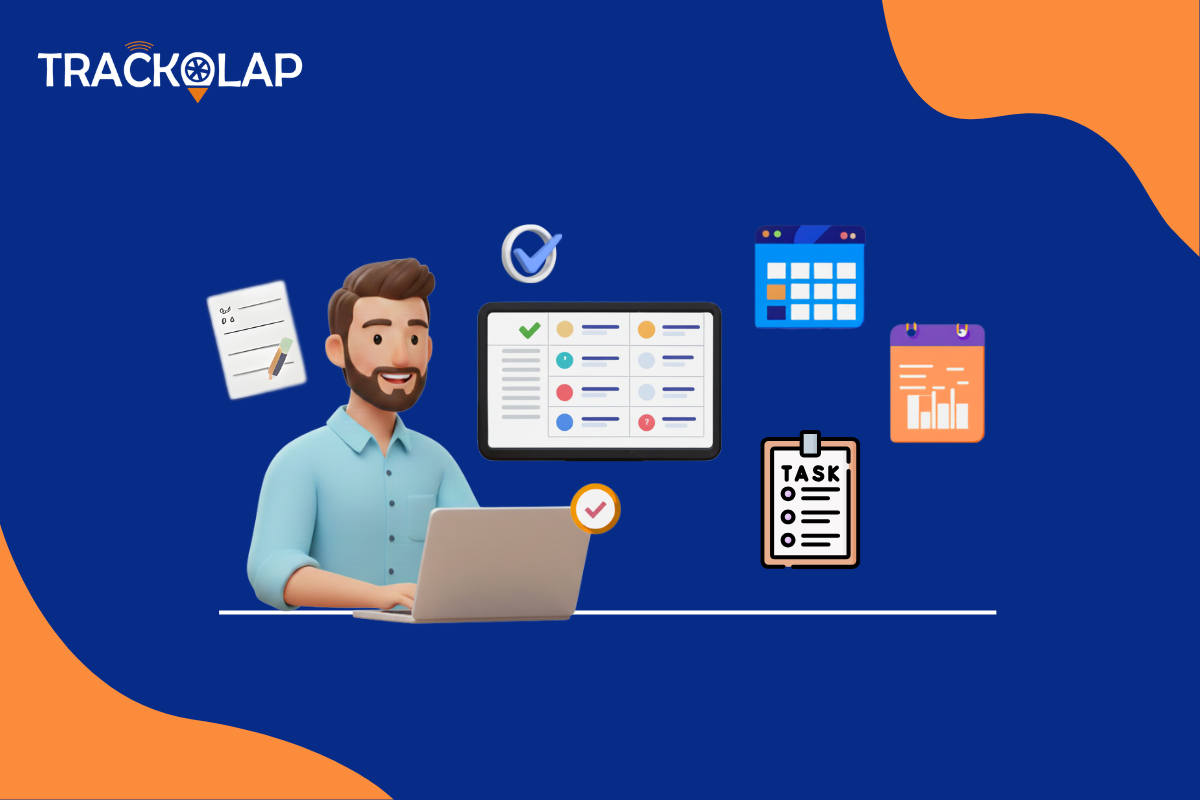
How can Expense Management Software Optimize Your Field Operations?
Are you tired of the endless paperwork and manual calculations involved in managing your field operations? Do you find it challenging to track expenses accurately and efficiently? If yes, then it's the right time to transform the way you manage overall field sales expenses through expense management software. This solution is ideal for revolutionizing the way you manage overall field expenses, saving you time, money, and headaches.
Imagine your field reps are out in the trenches, meeting clients and closing deals. Instead of spending valuable time filling out paper forms or manually inputting data, they can capture expenses on the go with a simple mobile app. Receipts are scanned and stored digitally, eliminating the risk of lost or damaged paperwork. A streamlined expense reporting software saves time and ensures accuracy and compliance with expense policies.
Sounds interesting? Let's dive deeper into how expense management software can optimize your field operations and drive your business forward. Discover how to streamline expense management with field executives tracking to streamline processes, improve cost control, and enhance overall efficiency.
What is Expense Management Software?
Expense management software is a centralized digital platform designed to optimize the journey of monitoring, managing, and reimbursing field employee’s expenses with a few simple steps. It focuses on replacing traditional, time-consuming, paper-based systems with an expense management solution that automates many tasks.
Employees can input expenses, attach receipts, and submit expense reports with just a few clicks. Moreover, this platform routes the reports to proceed with approvals based on predefined workflows, which reduces managers' manual efforts and leaves room for human errors or delays in reimbursements.
Beyond automating reimbursements, expense management software provides valuable insights into spending patterns. Furthermore, it simplifies generating reports and analytics, helping managers identify cost-saving opportunities from diverse field operations. It tracks budget adherence and ensures compliance with pre-set expense-based policies.
Moreover, by offering complete visibility into expenses, finance teams can make informed decisions through expense reporting software and even streamline resource allocations.
How Does Expense Management Software Work?
Expense management software optimizes the entire expense procedure, from capturing varied receipts to reimbursement. Field employees can seamlessly input expenses, attach receipts, and submit expense claims for approval—all under one platform. Furthermore, managers review, approve, or reject certain expenses to ensure companies stay compliant with predefined policies and budgets.
Moreover, expense reporting software automates data entry, generates detailed and accurate reports, and integrates with accounting systems for effortless reconciliation. This solution saves time, minimizes errors, and offers insights into spending patterns to ensure managers make data-driven decisions for further field operations.
Let us understand the process with a few simple steps listed below:
Step 1: Employees need to register expenses into the software and submit it to the manager for approval and acquire suitable reimbursements
Step 2: Sales managers receive real-time notifications for expense claims through expense management solutions. They review, approve, or reject these claims with complete visibility.
Step 3: Meanwhile, the finance team audits expense analytics through expense reporting software to ensure meeting compliance when needed.
Step 4: After the approval of the expense claim, managers make sure to proceed with reimbursement promptly.
Step 5: The centralized expense management solution automates the process of generating reports or detailed analytics for further external audits
Why Do You Need Expense Management Software?
The expense management system optimizes the process of recording, submitting, and approving expenses for field operations under one platform. This approach minimizes the time and effort of field employees and finance teams spent on manual data entry, among other things.
1. Saves Field Operational Cost
By incorporating centralized systems for expense monitoring, managers can identify cost-saving opportunities, eliminate unnecessary expenses, minimize fuel costs by optimizing routes through field executive tracking, and minimize the risk of reimbursement-based frauds or errors in expense record-keeping.
2. Provides Real-time Visibility
The expense management system provides real-time visibility into the organization’s overall spending for field sales operations through a centralized dashboard. This approach allows managers to make informed decisions for managing overall finances.
In addition, sales managers can quickly identify budget overruns, monitor common trends in overall expenses, and adjust sales spending through reports to drive growth within budget constraints.
3. Adherence to Expense Policy Compliance
Incorporate expense management strategies with TrackOlap to ensure seamless compliance with expense policies. This approach enforces spending guidelines and ensures employees avoid false expense claims, minimizes financial risks, and fosters accountability with field employees.
4. Paperless Expense Management
By leveraging digital expense management for your field operations, you will minimize your carbon footprint and optimize your financial processes. Our expense management system offers secure storage, making critical documents easily accessible for audits or reconciliations.
5. Improved Data Accuracy and Reduced Errors
Automated expense tracking enhances data accuracy and minimizes errors associated with manual processes. By eliminating human intervention in recording and reporting financial data for field operations, this system tends to offer reliable financial information.
In addition, accurate financial data is a key to effective financial planning and analysis. Organizations can confidently make strategic decisions based on trustworthy figures, optimizing resource allocation and driving overall business performance.
6. Enhanced Job Satisfaction
A user-friendly expense management system tends to simplify submitting and tracking expenses, reducing administrative burdens for employees. This solution contributes to a more positive employee experience by eliminating frustration and saving time.
Streamlined expense management enhances employee satisfaction and benefits your company with improved procedures. A smoother process can lead to increased efficiency, reduced errors, and faster reimbursements.
7. Effective Expense Reporting & Auditing
Expense management tools provide robust reporting and auditing capabilities. Organizations can streamline internal audits and conduct in-depth financial analyses by offering detailed transaction data. This comprehensive visibility into spending patterns empowers businesses to make data-driven decisions, identify cost-saving opportunities, and maintain financial control.
How Can Expense Management Software Simplify Field Operations?
Expense reporting software can be a game-changer solution for your organization. It optimizes expense claim procedure, enhances field visibility, and gives you better control over the field operation. By integrating detailed reports with the features of field executive tracking, sales managers can easily enhance the effectiveness of field workflows and drive efficiency.
1. Enhance Expense Claim & Approval Procedure
Seamless Evidence Submission: Field employees can swiftly capture and upload expense receipts directly from the field, eliminating paperwork and delays.
Swift Review and Approval: The software's hierarchical approval system ensures rapid claims processing, minimizing bottlenecks and improving employee satisfaction.
Real-time Status Updates: Instant notifications keep managers informed about the progress of expense claims, reducing the number of queries and follow-ups.
2. Improved Financial Visibility and Control
Predefined Spending Limits: By setting clear expense limitations or boundaries at different levels of the organization, managers can prevent overspending and maintain financial discipline.
Access Actionable Insights: Detailed expense reports provide valuable data on spending patterns, enabling managers to identify cost-saving opportunities and streamline budget management.
Prevent Potential Fraud: The robust capability to cross-check claimed amounts with submitted evidence in real time helps managers prevent fraudulent claims and ensures accurate financial reporting.
3. Enhance Field Operational Efficiency
Reduce Administrative Burden: Automating expense management frees up time for both field staff and finance teams to focus on core business activities.
Strengthen Compliance: This software ensures adherence to expense policies and predefined budgets, reducing the risk of non-compliance issues and penalties.
Facilitate Audits: Comprehensive expense data is readily available for audits, simplifying the calculation of profits across varied field operations and minimizing disruptions.
By utilizing expense management platforms, organizations can improve efficiency in field operations and drive bette r results by digging into comprehensive data and analytics and accordingly allocate resources and efforts for further operations.
Best Practices to Integrate Expense Management Solutions into Business Operations
1. Conduct Effective Training For Field Employees
Provide comprehensive training tailored to different roles to equip your entire workforce with the knowledge to utilize the software effectively. From entry-level staff to finance experts, ensure everyone has the tools to succeed.
In addition, offer regular refresher courses to keep your team updated on the latest features and best practices. Continuous learning ensures everyone maximizes the software's potential and adapts to evolving business needs.
2. Build Clear Expense Policies and Procedures
Create clear procedures and expense policies for your field operations. This process can involve specific guidelines for submitting expense claims, streamlining approval workflows, and defining exceptions. Defined procedures will ensure consistent and efficient expense handling across the organization.
3. Optimize Expense Management for Field Operations
Effectively managing field operation expenses requires constant tracking. Look closely at expense management records to identify bottlenecks and areas for improvement. Regular audits will uncover opportunities to streamline workflows, such as automating approval processes or simplifying data entry.
Leverage data insights to optimize expense policies and budgets. Identify spending patterns, cost-saving opportunities, and potential compliance issues.
4. Leverage Expense Data for Improved Decision-making
By closely looking into spending patterns, you can pinpoint areas of excessive expenditure and uncover cost-saving potentials. Using expense management tools, managers can identify trends, optimize budgets, and make data-driven decisions that drive overall sales performance.
Analyze spending trends to identify cost-saving opportunities and optimize resource allocation. Use these insights to inform broader financial planning, from budgeting to investment decisions.
Conclusion
Expense management software can streamline your field operations by continuously tracking expenses, reducing paperwork, and providing valuable insights into spending habits.
With features like mobile app capabilities, detecting expense patterns, and real-time reporting, field employees can easily capture and submit expenses.
At the same time, managers gain better visibility into costs, enabling data-driven decisions to improve efficiency and profitability. Sounds interesting? Contact our team today to learn more about expense management tools.






























 Back to Blogs
Back to Blogs










 D-5 Sector-59, Noida, Uttar Pradesh (India)
D-5 Sector-59, Noida, Uttar Pradesh (India) contactus@trackolap.com
contactus@trackolap.com 7011494501
7011494501










